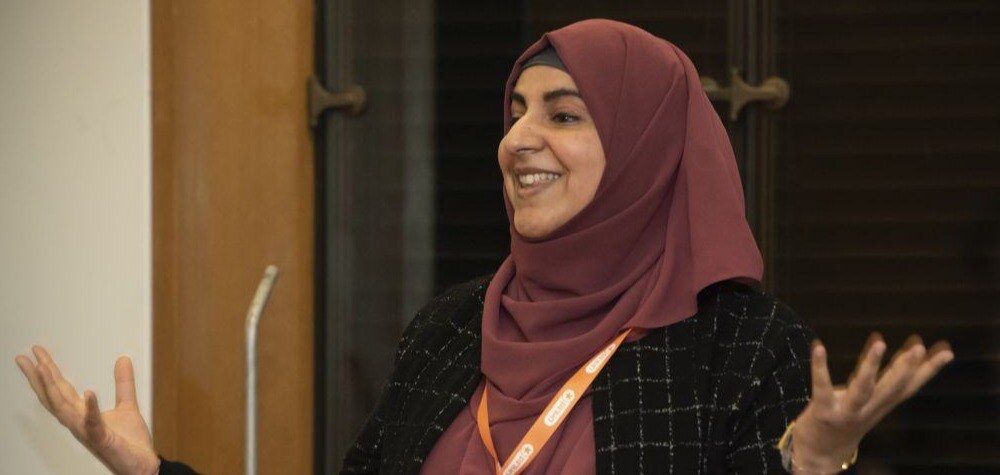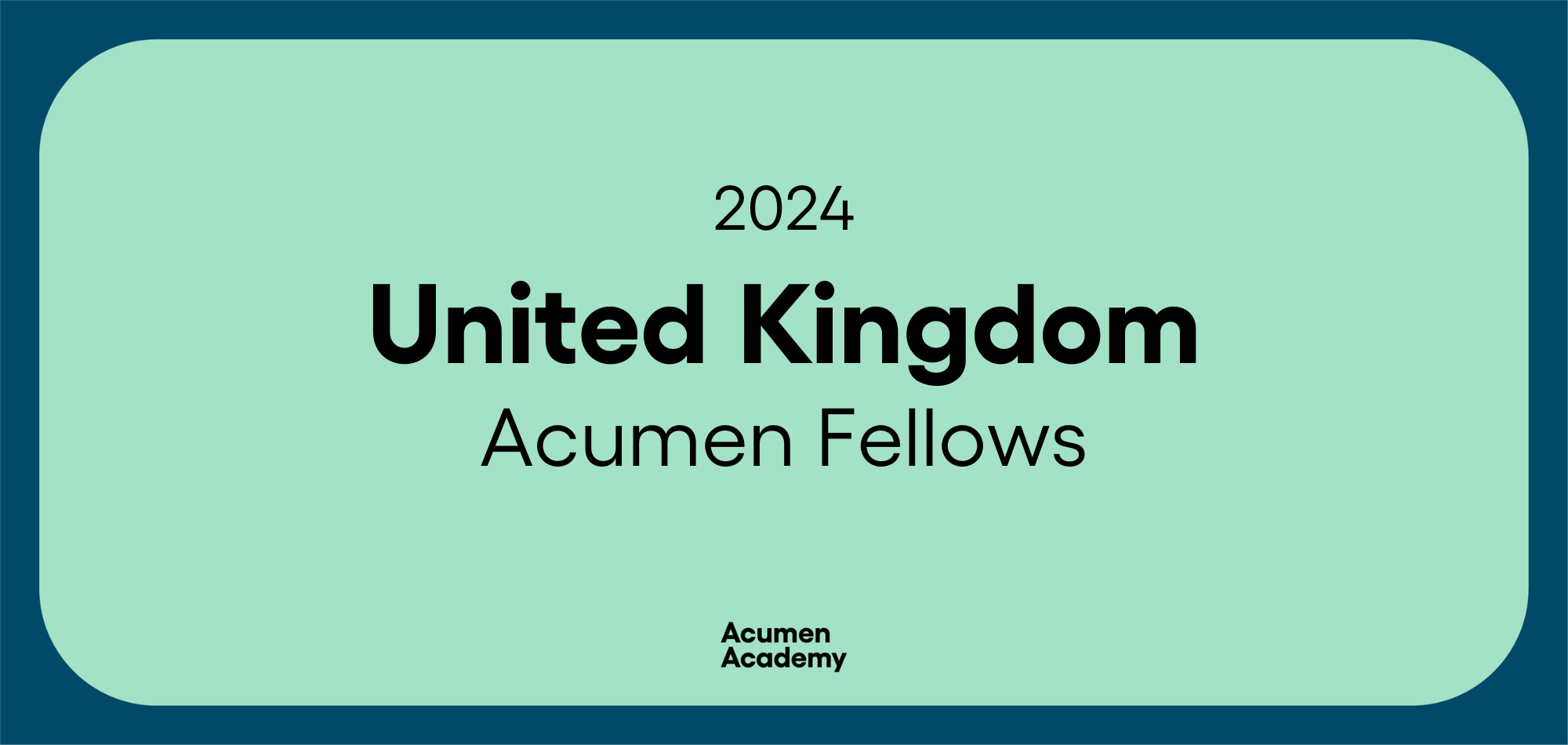Leadership
Reimagining leadership: Creating access to careers in healthcare
Dr. Hinnah Rafique faced barriers to getting into medical school, so she launched a social enterprise committed to ensuring others like her wouldn’t.
April 1, 2025
Our Reimagining Leadership series spotlights Acumen Fellows who are building solutions that solve problems of poverty and create a world based on dignity. By sharing these stories, our hope is that we can reimagine existing systems and role model a new definition of success.
As the CEO and founder of multi-award-winning social enterprise Generation Medics, 2022 UK Acumen Fellow Dr. Hinnah Rafique has dedicated her career to ensuring that aspiring and current healthcare professionals — regardless of background, postcode, or personal circumstances — have access to the opportunities, support, and knowledge they need to succeed.
Dr. Hinnah has been recognized in WISE100’s Women in Social Enterprise 2025 list, which celebrates 100 of the most inspiring and influential women leading social enterprises across the UK. This prestigious recognition emphasizes the dedication, innovation, and impact of women driving social change through purpose-led organizations, and is a testament to Dr. Hinnah’s unwavering commitment to creating opportunities, mentoring others, and expanding access to careers in healthcare.
We spoke with Dr. Hinnah about how her experiences have shaped her work, the impact Generation Medics has had thus far, and how expanding access and opportunities across the healthcare workforce drives systemic change.
Q: What called you to do this work?
I didn’t have any medics in my family, and I lived in an area that still has low participation in higher education. It was difficult for me to get into medical school, and I knew there were many others facing similar challenges. I was —and am— driven by the fact that if you’re from a state school, you’re much less likely to have access to unbiased advice or a wider social network that could help you strive, apply, and succeed. I worked full-time as a doctor — my dream career — and saw firsthand that opportunities aren't open to all.
Through my lived experiences in business, event planning, and outreach, I piloted a project that was quickly oversubscribed. After doing that for a while, I was at a coffee shop with some friends and we realized there wasn’t any other formalized, professional organization that offered this service — which was shocking to us. We assumed there would be other organizations out there committed to equity of opportunity, helping improve social mobility and health outcomes.
I visualized how the organization could flourish and support more people. That’s when we went from having a great idea to taking it forward: we dealt with the practical nitty-gritty stuff, and formalized Generation Medics as an organization. I took a year out to work on Generation Medics — 10 years later, I'm still here! The transition was difficult: I had to find creative solutions to work with NHS colleagues and schools, and build a customer base. I learned a lot about myself and built my support network.
Q: You’ve paved the way for many women who dream of a career in the healthcare sector, including being the first female NHS Clinical Entrepreneur in 2015. How has your identity shaped how you navigate this space?
Being a woman and from a global majority background has given me a unique perspective in the healthcare sector, which has historically been dominated by certain groups. My lived experiences have shaped the way I approach my work, from advocating for inclusive healthcare to mentoring others who face similar barriers.
At times, I’ve encountered unconscious bias and structural challenges, whether in leadership opportunities or access to resources. However, these experiences have strengthened my commitment to breaking down barriers, using my platform to advocate for equity, and ensuring that diverse voices are heard in healthcare. My background has given me an acute awareness of the importance of culturally competent healthcare. I’ve worked to create more inclusive spaces, whether through mentorship, policy influence, or patient care, ensuring that diverse communities receive the support they deserve.
Better representation allows perspectives and ideas to be recognized that would not have been considered previously. This intentional inclusion ensures that decision-making is more reflective of the broader population. Diversity of backgrounds and experiences not only creates a more supportive environment for marginalized communities, but also enhances an organization's awareness and impact.
Q: Generation Medics is the largest social enterprise run by medics, for medics. Why was it important for you to adopt a social enterprise model?
From the very beginning, we knew that if we wanted to increase access to healthcare careers, our own organization had to be just as accessible. That’s why we chose a social enterprise model — it allows us to operate sustainably while keeping our impact at the heart of everything we do.
Rather than relying on short-term funding or donations, we’ve built a model where the money we generate is reinvested back into the social mission and therefore the community. This ensures that we can provide consistent, long-term support without being dependent on external grants or handouts. But it’s important to note that this is a journey. We didn’t get it right the first time and have refined our business model several times over the years in order to adapt to changing political and financial landscapes.
Our work is about empowerment — helping people build confidence, skills, and networks so they can take control of their futures. We didn’t want to create something that felt like charity, because we believe equity of opportunity should be available to all. It’s about respect and showing that everyone, regardless of their background, deserves access to opportunities in healthcare.
Q: How has your impact deepened and evolved since starting the organization?
After the resounding success and evidence of impact from the programmes for aspiring medics, Generation Medics expanded its remit to include support for young people interested in other careers in healthcare, such as nursing, midwifery, dentistry, and paramedic roles, with the aim of both broadening the options available to students and helping the NHS (and wider health and social care sector) find a larger talent pool in these areas.
The success stories of individuals who have benefited from Generation Medics provide valuable insight into what has worked well, showing how support and mentorship can significantly impact students' journeys. These personal stories not only highlight the effectiveness of the programmes but also inspire others by demonstrating pathways to success in various healthcare careers, reinforcing the organization’s commitment to nurturing talent across the health and social care sector.
Q: Your work sits at the intersections of healthcare, education, social mobility and technology. What excites you about this and how do you feel this will evolve in the coming years?
What excites me most about working at the intersections of healthcare, education, social mobility, and technology is the incredible potential for innovation to drive real, systemic change. These fields don’t exist in silos — they’re deeply interconnected, and when we bring them together, we create powerful opportunities for people who may have never seen themselves in healthcare before. AI and emerging technologies are already reshaping healthcare, from diagnostics to personalized treatment plans, and they’re also making education more accessible.
At Generation Medics we’re committed to ensuring that these advancements don’t widen existing inequalities but instead help to break down barriers. By providing holistic support, we give participants a full view of the different roles and pathways available in healthcare — not just the traditional routes, but opportunities in research, policy, digital health, and beyond.
Health education is also advancing, with new ways of learning — from immersive simulations to AI-driven tutoring — making knowledge more accessible than ever before. We see ourselves as part of this movement, ensuring that anyone, regardless of background, has the tools and support to pursue and thrive in a career in healthcare.
Looking ahead, I believe the intersections of these fields will continue to create new possibilities for inclusion, innovation, and impact. Generation Medics will be adapting, evolving, and making sure that healthcare careers remain within reach for everyone.
Q: This year marks the 10 year anniversary of Generation Medics. What achievements have made you the most proud?
While we’re incredibly proud to have supported over 55,000 people into work or training, what stands out the most are their individual journeys — the stories of people who never thought a career in healthcare was possible for them but are now thriving in the sector. We’ve seen students from underrepresented backgrounds gain the confidence to apply for medical school, career changers successfully transition into healthcare roles, and professionals break barriers in leadership.
Beyond the numbers, we’re proud of the systemic impact we’ve had — challenging outdated structures, increasing access to healthcare careers, feeding into policy, generating data on what best practice looks like, and driving change in education and workforce development. Our work has been about more than just opportunity; it’s about building a healthcare system that truly reflects the communities it serves.
As we celebrate this milestone, we’re more committed than ever to expanding our reach, deepening our impact, and ensuring that the next 10 years bring even greater transformation for individuals and the healthcare sector as a whole.
Q: If you had a magic wand, what would help you amplify your impact?
I would focus on four key areas to amplify our impact: accessibility, innovation, long-term funding, and systemic change.
First, I’d ensure that everyone, regardless of background, has seamless access to the resources, mentorship, and opportunities they need to enter and thrive in healthcare. True social mobility starts with breaking down barriers and making support universally available.
I’d harness the full potential of technology, particularly AI, to revolutionize health education and training. Smarter, more adaptive learning tools are helping us personalize support, making career pathways clearer and more achievable.
I’d secure multi-year funding to support long-term sustainability. Too often, impactful initiatives are limited by short-term grants, restricting their ability to grow and make lasting change. With access to more stable, multi-year investment, we could expand our reach, innovate further, and provide consistent, high-quality support to those who need it most.
Finally, I’d try to drive systemic change within the NHS and wider healthcare sector to create a more inclusive and sustainable workforce. This means embedding equity into recruitment, training, and career progression so that diversity isn’t just encouraged but is actively cultivated, supported, and celebrated.
While I may not have a magic wand, we’re working every day to make these changes a reality.
Q: What do you think are the key leadership behaviors needed to tackle systemic issues of poverty?
A holistic approach is essential, as poverty is shaped by social determinants of health such as housing, education, and healthcare access. Addressing these interconnected factors ensures that solutions go beyond short-term fixes and create lasting impact.
Economic empowerment is key to breaking cycles of poverty. Sustainable solutions, including fair wages, career development, and financial inclusion, provide individuals with the tools to build wealth and long-term stability.
Ensuring fair access to education, employment, and healthcare helps level the playing field and creates pathways for long-term success.
Collaboration and advocacy drive systemic change. Cross-sector partnerships between government, healthcare, education, and business can create innovative solutions, while policy advocacy ensures that progress is embedded in long-term structural reforms.
Finally, resilience is necessary to overcome setbacks and push for long-term change. Combating poverty is a complex, ongoing effort that requires persistence, adaptability, and a commitment to advocating for policies that create lasting economic and social transformation.

.png)
